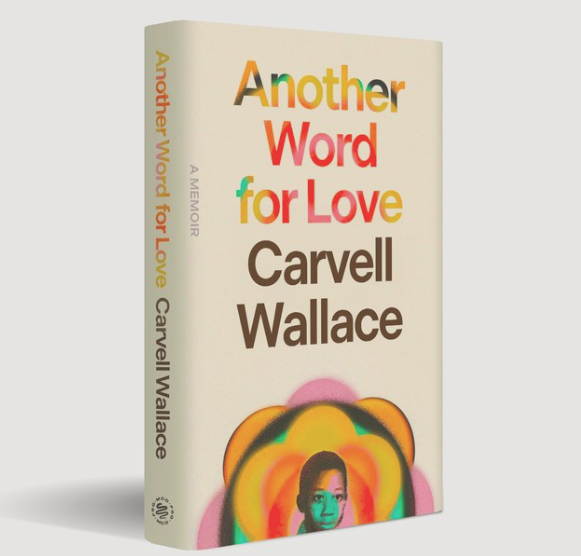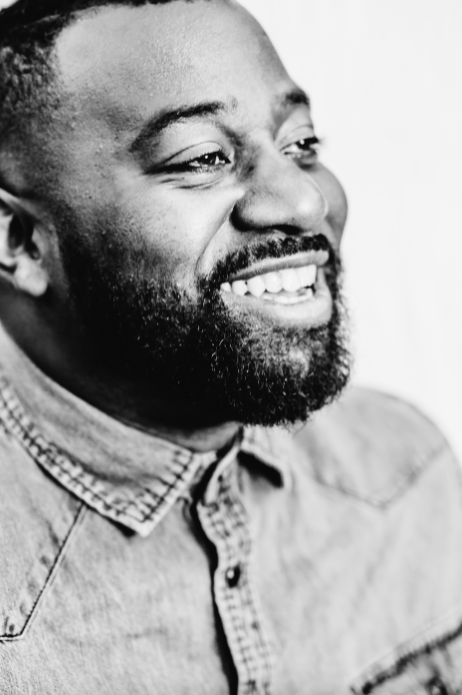>>We need your support! Become a 48hills member today so we can keep up our incredible local news + culture coverage. Just $20 a month helps sustain us. Join us here.
By page 23 of Carvell Wallace’s 253-page memoir, Another Word for Love (Farrar, Straus and Giroux, $28), my reviewer’s copy already has 11 tiny sticky notes flagging sentences and paragraphs worth revisiting. If this book was a beverage, it would be one to drink daily, like water; essential to not just the body’s composition, but to preserving one’s belief in fluidity.
The Oakland-based writer (who will be appearing June 20 at Berkeley Public Library and June 26 at Green Apple Books) chronicles the haphazard footpath of his life in a brilliantly told journey that takes him and his family through the darkest spaces imaginable, spinning dizzyingly and often painfully through young adulthood and early fatherhood. It concludes with Wallace, now 49 years old, telling readers they deserve to eat food that has been lovingly prepared and “hear stories in which each word, each sentence has been caressed in the luminescent glow of afternoon sunlight, trimmed in lacquered in sparkling fuchsia.” The honesty is unrelenting; the pain and conflict raw and multilayered, the courage and love complex and undeniable.

Wallace is a bestselling author, memoirist, and podcaster and a regular long-form contributor to the New York Times Magazine. His work has appeared in Rolling Stone, GQ, Esquire, Glamour, the New Yorker, Pitchfork, ESPN The Magazine, The Guardian, and others. In 2019, he published The Sixth Man, co-written with Golden State Warriors forward Andre Iguodala. Wallace’s 2017 podcast Closer Than They Appear explored race and identity in America and won a Radio Television Digital News Award. His 10-episode podcast, Finding Fred, was named #1 podcast of 2019 by The Atlantic and nominated for a Peabody Award. Before writing professionally, Wallace spent 15 years working in the youth nonprofit world doing direct case management and program design for youth populations in incarceration, and foster care. He lectures in the narrative department at the UC Berkeley School of Journalism.
Another Word is a ruminative memoir that draws together his life experiences with reflections on such disparate things as cooking, nature, music, the L.A. riots of 1992 and the Black Lives Matter movement. Growing up Black and queer shapes many of the stories. It’s tempting to use the word “elevated” when reaching for a way to express the experience of reading the book. There is no sense of voyeurism, despite the densely personal trauma of physical and emotional neglect he describes.
Instead, the prevailing sense given and received is gratitude that he emerged bearing stories bursting with hope, honesty, humor and generosity of spirit. He writes: “Everything I learned about the body early on was about control and containment. Men were not to leak or make too much noise or express too much or lose a grip on anything.” Indoctrinated into the male myth, he comes as a teen to believe that the body’s purpose is to administer pain, that giving pleasure during sex was “a currency, a transaction, something you traded for power.”
Jump to 2003, when his son was born and the look the newborn gave him was “absurd and frightening and enchanting and miraculous all at once.” The mystery of his firstborn’s wail opened up a channel. He writes, “If someone can bring you to life by simply looking at you then that is what this person did to me.” His daughter’s birth two and a half years later is equally magnificent and cracks the insulating, isolating shell he had created with drugs, violence, avoidance, causing him to fully surrender. The world, he recognizes, was calling him to “become something empty, something to be filled with god, something to be filled with love, whatever that was.”

Lest this sound like his crashes and face-plant falls were simply a preamble to a “come to Jesus” moment, be assured they are not. Each story is crafted with soulful and searing vigor and includes awareness that “new behavior is an entire lifetime of practice.” No apology will ever amend or change the old record of his or anyone’s wrongful behavior. Nor is the memoir a prescription for self-healing and actualization—Carvell is too honest to bullshit himself or his readers.
Which is why I might never remove my Post-it notes, lest I forget that his fine writing includes story gems such as treasuring his memory of the “warm recklessness” of licking a stick of butter during a time when meals were scarce. Or how he used “weed, acid, red wine, white wine, Pacifico, mushrooms and whatever else I could get my hands” to hide an inner rot that has him searching for the divine. Or his bold, powerful tales of being a queer Black American. Even without a flag note, it’s hardest to imagine forgetting a magical connection he makes between sounds and words in a chapter involving jazz composer Charles Mingus, who wrote in his scores out-of-range notes the intended instrumentalist could never hope to play. Like Mingus’ compositions, Carvell’s memoir is, in his words, “The sound of us trying.”
Purchase Another Word For Love here and at independent bookstores.





